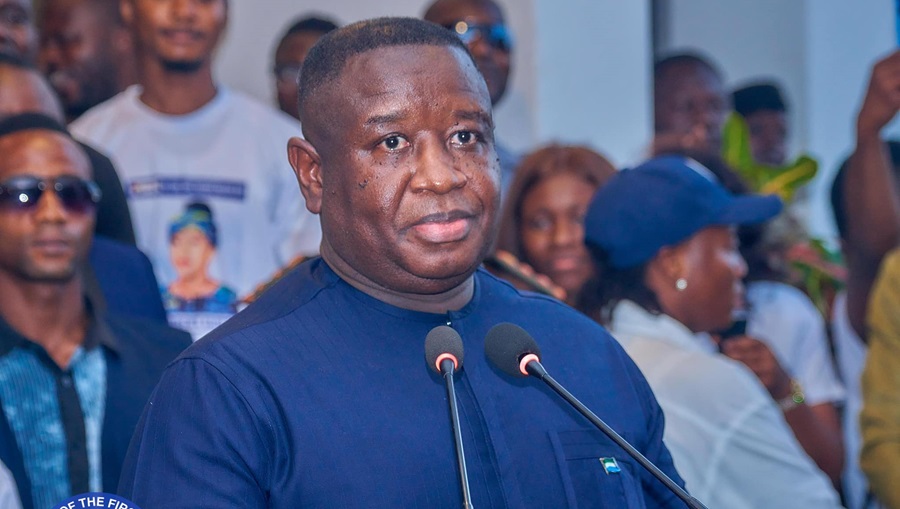Confronted with a challenging economic inheritance, President Julius Maada Bio’s administration has embarked on a rigorous fiscal consolidation path, implementing measures widely regarded as austerity. These policies, aimed at stabilizing the nation’s finances and fostering long-term economic resilience, have sparked considerable debate and scrutiny within Sierra Leone.
Upon assuming office, President Bio inherited a nation burdened with a significant debt load. The debt-to-GDP ratio stood at approximately 95.8% in 2022, raising serious concerns about fiscal sustainability and limiting the Government’s capacity for critical investments. Recent data from the African Development Bank indicates a decline to around 90.5% in 2023, with projections from the ECOWAS Bank for Investment and Development (EBID) forecasting further improvement to 80.0% by the end of 2023 and a projected 69.7% in 2024. The administration argues that sustained fiscal consolidation is essential to securing long-term stability and reducing the ratio to more manageable levels.
In response to these challenges, the Government has prioritized domestic revenue mobilization through several key measures. The continued rollout and enforcement of the Electronic Fiscal Device (EFD) system across various sectors aim to enhance Value Added Tax (VAT) and Goods and Services Tax (GST) collection, curbing tax evasion. Additionally, structural reforms within the National Revenue Authority (NRA) have focused on strengthening its Large Taxpayers Department and enhancing its capacity for tax audits, particularly in high-value sectors such as mining and telecommunications.
Efforts to formalize segments of the informal economy have also been intensified through business registration drives and awareness campaigns, broadening the tax base. While the tax-to-GDP ratio stood at 11.4% in 2022—down from 13.3% in 2021—these ongoing efforts aim to increase this figure, bringing it closer to the African average of 16.0% in 2022. The Government has also emphasized non-tax revenue collection, which constituted a notable 9.2% of GDP in 2022, with grants playing a major role.
On the expenditure side, the Government has introduced stringent cost-saving measures. The enhancement of the Integrated Financial Management Information System (IFMIS) seeks to improve budget execution and expenditure control across Government entities. Additionally, biometric verification of public sector employees has helped identify and eliminate ghost workers, resulting in significant savings on the national wage bill.
Stricter guidelines and approval processes have been implemented for Government travel, workshops and operational expenses. Capital expenditures have been strategically prioritized, focusing on projects essential for economic growth and human capital development.
In addressing public debt, the Government has pursued restructuring initiatives with both domestic and international creditors. This has included negotiations for extended repayment periods and potentially more favorable interest rates to ease the immediate debt service burden. A recent agreement with the International Monetary Fund (IMF) for a new Extended Credit Facility (ECF) arrangement further underscores the need for significant fiscal adjustment and debt management.
While these austerity measures are intended to stabilize Sierra Leone’s economy, they have raised concerns regarding their impact on social programs. The Bio administration has consistently prioritized the Free Quality Education Programme, but ensuring adequate funding for healthcare and social welfare remains challenging amid fiscal constraints. Civil society organizations and opposition groups continue to call for greater transparency in budget allocations and impact assessments to safeguard essential social services.
As the Government enforces austerity, scrutiny has increased regarding the lifestyle of Government officials, particularly Ministers. While ordinary citizens endure economic hardship, concerns persist about whether the Government’s fiscal prudence is reflected in the behavior and expenditures of those in power.
Reports, often amplified on social media and in local news outlets, highlight instances of lavish spending, including luxury vehicles, expensive international travel beyond essential state business and extravagant Government functions. These observations have fueled skepticism, raising questions about the sincerity of the Government’s austerity measures and potentially undermining public trust.
The perceived disparity between the Government’s call for fiscal discipline and the lifestyle of some of its officials poses a significant challenge. If citizens believe they are shouldering the burden of economic hardship while leaders continue with business as usual, there is a risk of decreased public cooperation in revenue collection efforts and growing social discontent.
To address this issue, the Government must demonstrate a stronger commitment to fiscal discipline. This could involve implementing stricter guidelines on official travel and expenditure, ensuring greater transparency regarding public officials’ financial assets and holding accountable those who misuse public funds. Leading by example will be essential in reinforcing the credibility of the austerity program.
President Bio’s administration is navigating a complex economic landscape, emphasizing fiscal consolidation as a path to stability. The reported decline in the debt-to-GDP ratio and efforts to enhance revenue collection and control expenditure are steps in the right direction. However, the long-term success of these austerity measures depends not only on their effective implementation but also on the Government’s ability to foster transparency, protect vital social investments and ensure that sacrifices are equitably shared across all levels of society.
As Sierra Leone moves forward, the coming years will be crucial in determining the tangible impact of these policies on economic recovery and the livelihoods of its citizens. The success of the austerity measures will ultimately hinge on whether the Government can balance fiscal responsibility with social equity, ensuring a more sustainable and inclusive economic future for all.











